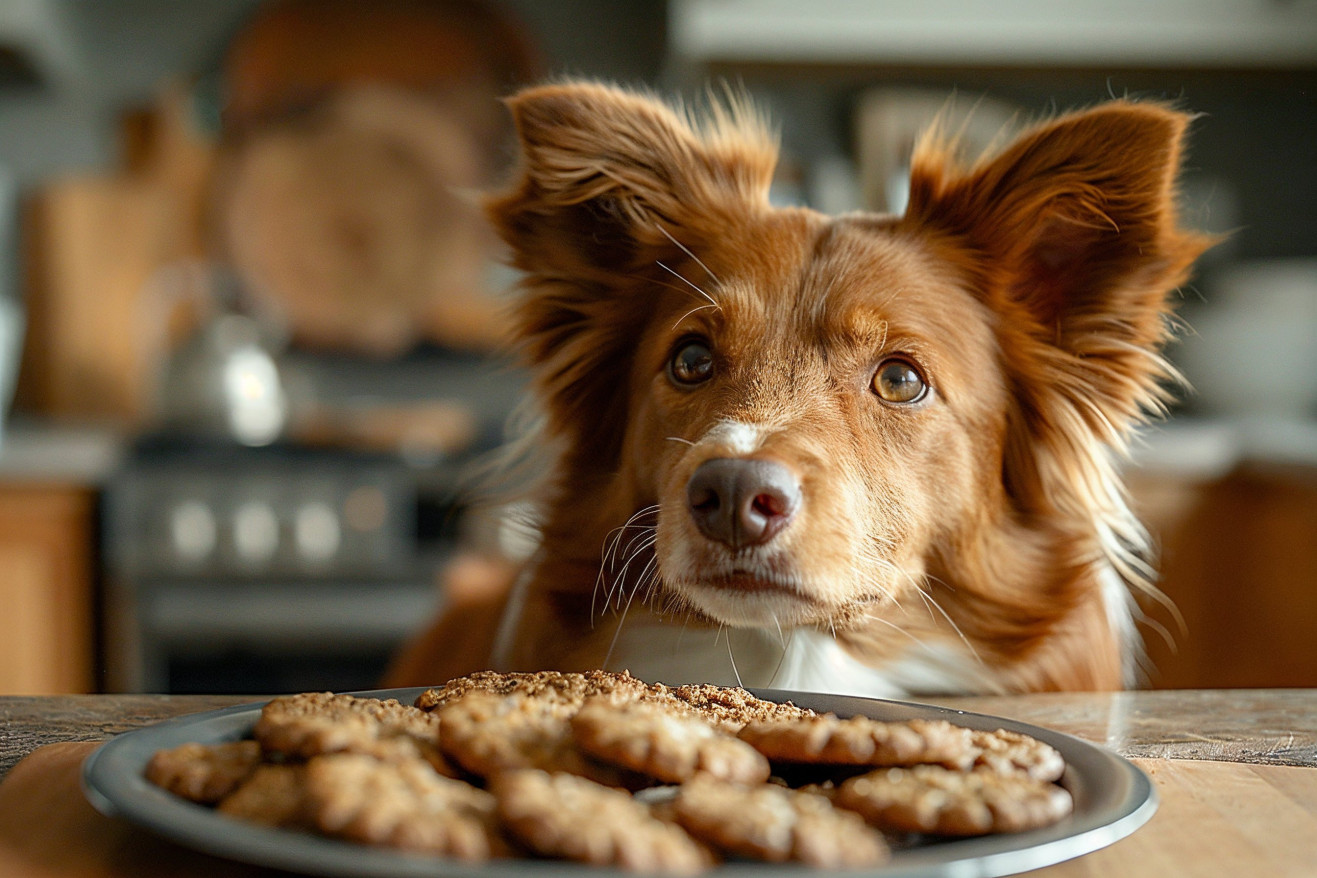Can Dogs Eat Ginger Snaps? Understanding the Risks
10 March 2024 • Updated 9 March 2024

Ginger snaps are a popular human snack, but can you share them with your dog? While ginger itself may be okay for dogs in small amounts, ginger snaps are not recommended for dogs because of their high sugar content and potentially toxic ingredients like nutmeg and butter. This article will discuss why ginger snaps may not be safe for dogs and what to look out for in the ingredients list.
This article will cover veterinary nutrition recommendations and toxicology studies, as well as the ingredients in ginger snaps and how they may impact dogs. It will also cover the potential risks and benefits of ginger and other common spices found in ginger snaps, so you can better understand what you’re giving your dog.
This article will rely on information from reputable sources to help you better understand your dog’s diet and the best way to approach their treats.
Can dogs eat ginger snaps?
Ginger Snaps: Not a Good Fit for Your Dog’s Diet
While ginger snaps may be a delicious treat for humans, pet parents may be tempted to share a ginger snap with their dog due to the cookies’ sweet and spicy flavor. However, MasterClass warns against giving dogs sugar because it can lead to health problems like diabetes and heart disease.
A typical ginger snap recipe includes sugar, flour, butter, and spices like ginger, cinnamon, and nutmeg. While ginger can be helpful for digestion in small amounts, the sugar in ginger snaps is a concern. Volhard Dog Nutrition explains that the sugar in treats like ginger snaps can cause obesity and metabolic issues in dogs.
In addition, dogs can suffer from nutmeg toxicity, which is a common ingredient in ginger snaps, and the symptoms are serious and should not be ignored.
Because ginger snaps are not nutritionally appropriate for dogs and don’t meet their dietary needs, pet parents should look for healthier options. A dog’s diet should be made up of balanced, species-appropriate ingredients that don’t contain the sugar and fat that are often found in human treats.
This article will discuss the role of sugar and sweeteners in a dog’s diet and explain why some of the ingredients in ginger snaps should be avoided to help protect a dog’s health.
How Much Sugar Is Safe in a Dog’s Diet?
Although sugar isn’t necessarily toxic to dogs, the impact it has on their health is anything but sweet. According to PetMD, dogs that eat too much sugar can experience anything from an upset stomach to obesity, metabolic changes, and even more serious issues like pancreatitis.
Dogs can taste sweetness, which is why they may occasionally enjoy fruits and some vegetables, but because these foods contain natural sugars, they’re generally safe as long as they don’t make up more than 10% of a dog’s diet.
When it comes to understanding the impact of natural sugars and artificial sweeteners on your dog’s health, it’s important to know the difference between the two. Trupanion says that while the fructose in fruits is better for dogs than the sugars in processed foods, they should still be given in moderation.
On the other hand, artificial sweeteners, especially xylitol, are highly dangerous. The FDA warns that xylitol is extremely toxic to dogs and can cause hypoglycemia, liver failure, and death.
With these dangers in mind, it’s easy to see that the sweet taste of a treat like ginger snaps can have a high cost when it comes to your dog’s health. When planning your dog’s diet, it’s important to talk to your vet about the right amount of sugar for them and to look for healthier treats that will help them stay healthy and happy.
Ginger: Canine Spice of Life?
Ginger, with its strong smell and spicy taste, is not only a human taste sensation but also a potential source of health benefits for dogs. The American Kennel Club notes that ginger is safe for dogs in small doses and can help with a variety of issues, including digestion, gas, and even inflammation that can help with arthritis.
The AKC also points to studies that show ginger’s ability to help with nausea in people, and while there’s no clinical evidence to support this in dogs, anecdotal evidence suggests that ginger can help with motion sickness and chemotherapy-induced nausea in canines.
However, there are also potential downsides to giving ginger to dogs. For example, ginger can cause stomach upset in dogs if it’s given in large doses. In addition, ginger should be avoided in dogs with bleeding disorders and those taking anticoagulant medications, and it may interact with other medications.
In addition, ginger can affect blood sugar and blood pressure, so it should be used with caution in dogs with diabetes and heart disease, and it’s generally not recommended for pregnant or nursing dogs.
Ginger snaps contain a small amount of ginger, and that amount is unlikely to be enough to provide any health benefits to dogs. In addition, the other ingredients in ginger snaps may counteract any potential benefits of ginger.
If you’re thinking about giving your dog ginger, it’s important to use it in moderation and to talk to your vet about the potential risks and benefits. With your vet’s help, you can make sure that you’re using ginger in a way that’s safe and comfortable for your dog.
Spices in Dog Diets: Cinnamon and Nutmeg
The spices cinnamon and nutmeg are frequently used in ginger snaps and can have a big impact on a dog’s health. Nutmeg contains myristicin, a compound found in insecticides, and is especially poisonous to dogs.
The Pet Poison Helpline notes that nutmeg can lead to severe reactions in dogs, including hallucinations, disorientation, tachycardia, dry mouth, abdominal pain, and seizures. While small amounts may not lead to any symptoms, the risk of nutmeg toxicity is a real concern for dog owners.
Cinnamon is not toxic to dogs, but it should still be used with caution. The American Kennel Club explains that while cinnamon can be an irritant in large doses, leading to gastrointestinal or skin issues, the amount found in baked goods is unlikely to be harmful.
Still, dog owners should be aware that cinnamon essential oil is toxic, and the high sugar content and potential presence of harmful ingredients like xylitol in ginger snaps make them a bad choice for dogs.
When it comes to spices in a dog’s diet, portion control is key. If dog owners decide to give their dogs spices, they should be used in moderation, in small amounts, and without other unhealthy ingredients. While spices can make food more appealing and even offer some health benefits, dog owners should always talk to their vet before adding anything new to their dog’s diet.
Healthy Snacks: Dog-Friendly Alternatives to Ginger Snaps
Thankfully, there are many healthy alternatives to ginger snaps that you can give your dog as a treat. According to Medical News Today, there are many human foods that dogs can eat in moderation, including carrots, apples, and blueberries.
These fruits and vegetables are full of vitamins and minerals and don’t contain the high levels of sugar and fat found in many processed snacks. These whole, unprocessed foods can be a great way to give your dog a variety of nutrients that can help support their overall health.
If you’re looking to cut down on processed foods in your dog’s diet, DogTime recommends adding whole foods like sweet potatoes and broccoli, which can help with digestion and weight control.
In addition, choosing treats that don’t contain additives can help reduce the risk of allergies and sensitivities in your dog. Plus, many of these treats, especially crunchy vegetables, can help keep your dog’s teeth clean by acting as a natural toothbrush as they chew.
If you want to make sure you’re treating your dog responsibly, Hill’s Pet recommends making sure that you account for these treats in your dog’s daily calorie intake and talking to your vet about the best way to incorporate these treats into your dog’s diet. However, by choosing natural, high-quality treats, you can make sure that you’re giving your dog a snack that they’ll love while also supporting their health and well-being.
Final Thoughts: Dog Wellness and Treat Choices
In this article, we’ve delved into the ins and outs of feeding ginger snaps to dogs—a treat that’s best left to humans. From the high sugar content and the potential for toxic ingredients like nutmeg to the other spices and fats that aren’t part of a dog’s natural diet, it’s clear that there’s a reason why most experts advise against giving your dog ginger snaps.
This article also highlights the importance of knowing your dog’s nutritional needs, as human treats can often be dangerous to their health. It’s important to remember that dogs have different digestive systems than humans, and something that’s safe for us to eat could be toxic to them.
Being a good pet parent means making informed, health-based decisions about what you feed your dog. It’s important to talk to your vet to make sure that the treats and foods you’re giving your dog are both safe and healthy. As you think about the best ways to spoil your dog, we hope that you’ll prioritize their health with dog-friendly treats that are both nutritious and safe, while still being enjoyable.


